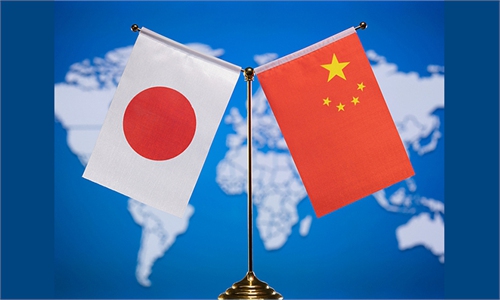Exclusive: Ex-secretary to Lee Teng-hui may take up Japanese association post in Taiwan

Tomohisa Hayakawa(right) and Lee Teng-hui. Screenshot from website
The Japanese government may be trying to create trouble with China, as the Global Times has learned from sources that it may appoint Tomohisa Hayakawa, who had served as secretary for both the notorious "godfather of Taiwan independence" Lee Teng-hui and "godmother of Taiwan independence" Kin Birei, as "special investigator" in the Taipei office of the "Japan-Taiwan Exchange Association."
The position of "special investigator" in the Taipei office of the association is usually filled by young scholars, and it will be rare to appoint a person very close to "Taiwan independence" forces.
Analysts said this unusual appointment, once confirmed, will reflect the nature of Fumio Kishida administration's policy over the Taiwan question. As of press time, the news has not been officially confirmed.
Japanese media outlet Sankei Shimbun reported Saturday that the government of Japan has been considering sending an incumbent official with Japan's Ministry of Defense to serve in the "Japan-Taiwan Exchange Association," in an attempt to raise the level of officials stationed in Taiwan island. This potential move was criticized as disregarding the fact that there are no "diplomatic relations" between the two sides.
Analysts say Japan's possible appointment of a former secretary to Lee Teng-hui could be another sly attempt to its relations with Taiwan.
On September 29, 1972, China and Japan signed and issued The Joint Communiqué of the Government of the People's Republic of China and the Government of Japan, normalizing their diplomatic ties. On December 1 of the same year, the Japanese government established the "Interchange Association" with its headquarters in Tokyo and offices in Taipei and Kaohsiung.
According to the Asahi Shimbun, after Japan severed "diplomatic ties" with Taiwan, the association was established to maintain exchanges with the island in the fields of economy, trade and culture. At that time, the name of the association did not include "Japan" or "Taiwan" in consideration of their informal relations, the media said.
The "Interchange Association" is nominally a nongovernmental organization responsible for consular and other related services, but its function is far more than just "maintaining people-to-people exchanges."
Japan added "Japan" and "Taiwan" to the name of the association and changed it into "Japan-Taiwan Exchange Association," under excuses of boosting its recognition. It also added sakura, Japan's national flower, and the plum blossom, symbol of the island of Taiwan, to the logo of the association. The name change is seen as the biggest "breakthrough" in the relations between Japan and Taiwan region since the two sides severed diplomatic ties. China has expressed strong dissatisfaction with Japan's negative move on the Taiwan question and urged Japan not to send wrong signals to Taiwan regional authorities and the international community.
The association openly claims on its website that it operates similarly to a "foreign embassy" in Taiwan. For some "Taiwan independence" activists, the association not only maintains exchanges in economy, trade, technology and other aspects between the two sides, but also is a communication platform for "official" affairs acting equivalent to an "embassy."
Born in 1977 in Ashikaga, Tochigi Prefecture, Hayakawa graduated from the Waseda University and now lives in Taipei. Hayakawa has written about how he became Lee's secretary. On his first trip to the island of Taiwan in 2002, he met a "Japanese-speaking aunt" at the office of the regional leader and was taken to a campaign of the Democratic Progressive Party candidate for mayor of Taipei. Hayakawa said he was "immediately moved by the 'Taiwan independence' speech."
After his return to Japan, Hayakawa became wildly involved in the so-called "Taiwan democracy movement." In December 2002, he served as head of the Friends of Lee Teng-hui Association of Japan. In 2003, he served as secretary of Kin Birei's office. Kin was Taiwan's former leader Chen Shui-bian's "national policy adviser."
In 2007, Hayakawa went to the "National Taiwan University" to study law. During his stay in the university, Hayakawa served as a staff member of Lee's visiting delegation to Japan three times. He was responsible for media correspondence and filming. In 2012, Lee named Hayakawa as secretary of his office.
Since then, Hayakawa published books under the name of Japanese secretary to former Taiwan regional leader, to spread Lee's "Taiwan independence" ideas.
Japan recently undertook negative moves toward China by upping the ante on the Taiwan question, China's hot-button issue, hyping the China threat theory in the Asia-Pacific region, and preparing to open the door of this region to NATO.
Experts said it signals Japan's long-term plan of interfering in the Taiwan question, which poses a severe provocation to China's domestic affairs, and will face a strong and fierce response from Beijing.
Wang Jian, a researcher at the Institute of Chinese History under the Chinese Academy of Social Sciences, told the Global Times on Wednesday that Japan and the DPP authorities have been causing trouble, but Japan does not want to completely "fall out" with China on the Taiwan question and dares not cross the red line easily. He stressed that the attempt to create "two Chinas" or "one China, one Taiwan" is doomed to fail, as it won't be openly supported by neither the Japan-Taiwan Exchange Association nor covertly by the Japanese government and the DPP.

